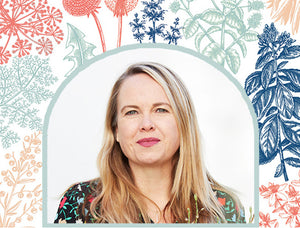In our previous journal post, "Can Herbal Support Be A Natural Alternative to HRT", we looked at the growing trend of women seeking natural alternatives to navigate the turbulent seas of menopause. Here, we turn our attention to the herbs themselves, drawing on the unique expertise of Melinda McDougall, Vice President of the National Institute of Medical Herbalists and Women's Health Coach.
Melinda leads her work with a passion for women’s health and supporting women through the menopause. For the last decade, she has been helping women across the world reclaim their sense of wellbeing, free themselves of symptoms, and feel inspired about life again. We are incredibly proud to collaborate with Melinda, both here and at the 2023 VERVE Wellness Festival (16th & 17th September) where she will take to the Yew Tree Stage as Happy Me CBD's guest speaker to share her wisdom for harnessing the power of menopause with natural medicine.
Nature’s apothecary carries an armoury of potent properties that have been shown to offer powerful support for some of the most challenging symptoms of perimenopause and menopause. Every woman is unique; they will have different symptoms, of varying degrees and at different times or stages. As unique as each person is to the next, however, there is no doubt that there are some symptoms that define the transition. Here, we pick out some of the most reported symptoms and the associated herbal solutions recognised for delivering support:
Anxiety & Low Mood:
St. John's Wort - long celebrated for its mood-balancing qualities, this herb can be a valuable ally during menopause. It has been shown to help alleviate anxiety and feelings of low mood by supporting the brain's neurotransmitter functions.
CBD - Anxiety is often linked to imbalances in neurotransmitters like serotonin and GABA and CBD has been shown to interact with the receptors in the body’s endocannabinoid system (ECS), including the serotonin and GABA receptors. By binding to these receptors, CBD may help regulate neurotransmitter activity, leading to a reduction in anxiety and stress levels to promote a sense of calm.
Hot Flashes & Night Sweats:
Black Cohosh - considered a star player in the menopause arsenal, specifically for mitigating the sudden radiating heat. Multiple studies (1-4) have indicated its potential to modulate neurotransmitter and hormonal pathways and its ability to reduce the frequency and intensity of hot flashes and night sweats.
Sage - used for centuries as a traditional herbal remedy in ancient Greece and Rome, as well as in Native American and Chinese medicine, modern studies (5) have shown promising evidence indicating the benefits of sage for calming hot flushes thanks to its phytoestrogenic properties. Phytoestrogens are understood to naturally mimic oestrogen in the body and, as oestrogen starts to decline in perimenopause, they have received increasing traction for their beneficial health effects for modulating temperature regulation.
Insomnia & Sleep Disruptions:
Valerian root - the extract of the root of valerian (Valeriana officinalis), a flowering plant, has been widely used to treat sleeping disorders in Europe for decades. Studies (6) indicate it can act as a gentle sedative that can promote restful sleep.
CBD - CBD is understood to interact with the endocannabinoid system (ECS) in the body, which plays a crucial role in regulating sleep patterns. Research suggests that CBD can enhance the signalling of receptors involved in sleep regulation, such as serotonin receptors, and through its ability to promote relaxation and reduce anxiety, CBD can help individuals achieve more restful sleep. Studies have shown that CBD may improve sleep quality, increase sleep duration, and reduce sleep disturbances, making it easier to fall asleep and stay asleep throughout the night.
Brain Fog & Cognition:
Ginkgo Biloba - with its cognitive-enhancing properties, ginko biloba may help combat the commonly reported symptom of brain fog that can accompany menopause. It promotes blood flow to the brain, potentially enhancing memory and mental clarity.
CBD – CBD’s interaction with the ECS extends to brain function. The ECS influences various cognitive processes, including memory, attention, and focus. CBD has been found to modulate receptors involved in neurotransmission, such as the adenosine receptor, which is associated with promoting wakefulness and enhancing cognitive function. By influencing these receptors, CBD may help alleviate brain fog, enhance mental clarity, and improve cognitive performance.
Painful Joints:
Turmeric - a potent anti-inflammatory herb, can be a game-changer for women experiencing joint pain during menopause. Its active compound, curcumin, has been lauded for its ability to reduce inflammation and ease discomfort.
CBD – As a potent anti-inflammatory and analgesic (pain reliever), studies (8) indicate that CBD can help to reduce pain, inflammation, and overall discomfort in the body through its interaction with the endocannabinoid system (ECS). It is also understood to help modulate pain signals by working with neurotransmitters such as serotonin and dopamine, to ultimately ease pain in the muscles and joints.
Loss of Libido:
Maca Root - often dubbed nature's aphrodisiac maca root may help reignite the spark by balancing hormones and enhancing sexual desire.
Sea Buckthorn - symptoms like vaginal dryness and vaginal atrophy (where the tissues of the vagina start to thin) contribute to the loss of desire during menopause. The bright orange berries of the sea buckthorn shrub are high in omega 7 and have been reported to offer an effective natural remedy for menopause dryness, especially in women who can’t use oestrogen creams or suppositories.
Itchy Skin:
Evening Primrose Oil - rich in essential fatty acids, evening primrose oil can soothe itchy and dry skin. It's a nourishing option for women dealing with skin-related menopausal symptoms.
Fatigue:
Rhodiola Rosea - an adaptogenic herb that boosts energy levels and combats fatigue, rhodiola rosea helps the body adapt to stress and supports overall vitality. Recent studies (9-10) document its impact on overall physical and mental health and found it to exert a notable anti-fatigue effect that increased mental performance, particularly the ability to concentrate.
CBD - CBD's potential energising effects are thought to be attributed to its impact on the ECS and its interaction with other receptor systems in the body. By influencing neurotransmitter activity and receptors involved in wakefulness, such as adenosine receptors, CBD may provide a gentle boost of energy and promote alertness without the stimulating effects of caffeine. Additionally, CBD's ability to reduce anxiety and enhance sleep quality can indirectly contribute to combating fatigue and increasing overall vitality.
It's important to note that while these herbs have shown promise in alleviating specific menopausal symptoms, individual responses may vary. Some women may find relief with a single herb, while others might benefit from a combination of remedies tailored to their unique needs.
Moreover, herbal remedies are not one-size-fits-all solutions. Consultation with a qualified healthcare practitions or medial herbalist is important for determining the most suitable herbs and dosages for your specific situation. These professionals take a holistic approach, considering your overall health and well-being, ensuring that the chosen herbs complement your journey through menopause. For CBD dosage, our CBD dosage calculator offers a quick and easy reference to find the dose best suited to you and your needs.
Incorporating herbal remedies into your menopausal toolkit can be a natural and empowering way to manage your symptoms. It's all about finding what resonates with you and embracing the support that nature has to offer during this transformative phase of life. Embrace the power of herbs, consult with experts, and embark on your menopausal journey with confidence and vitality.
Join us at VERVE Wellness Festival '23 on 16th & 17th of September, where Melinda will be speaking on the Yew Tree Stage at 1 p.m. on Saturday:
HOW TO HARNESS THE POWER OF MENOPAUSE WITH NATURAL MEDICINE, MELINDA MCDOUGALL: Find out how to feel inspired about navigating one of the biggest transitions of your life – the menopause.
Melinda says, ‘I’m excited to join the team at Happy Me CBD at VERVE Festival this weekend and share my passion for celebrating the menopause and supporting women to enjoy this phase of their lives with the help of herbal medicine.’ Melinda will share her top actionable tips to start you on your journey to a happy, healthy menopause, with or without HRT.
To see the full festival programme and book your tickets, click here.
References
1. Osmers R, Friede M, Liske E, Schnitker J, Freudenstein J, Henneicke-von Zepelin H. Efficacy and safety of isopropanolic black cohosh extract for climacteric symptoms. Obstet Gynecol. 2005;105(5 Pt 1):1074–1083. [PubMed]
2. Stoll W. Phytopharmacon influence atrophic vaginal epithelium: Double-blind study of Cimicifuga vs. estrogenic substances. Therapeutikon. 1987;1:23–31.
3. Wuttke W, Seidlova-Wuttke D, Gorkow C. The Cimicifuga preparation BNO 1055 vs. conjugated estrogens in a double-blind placebo-controlled study: effects on menopause symptoms and bone markers. Maturitas. 2003;44 Suppl 1:S67–S77. [PubMed]
4. Frei-Kleiner S, Schaffner W, Rahlfs V, Bodmer C, Birkhauser M. Cimicifuga racemosa dried ethanolic extract in menopausal disorders: a double-blind placebo-controlled clinical trial. Maturitas. 2005;51(4):397–404. [PubMed]
5. Bommer S, Klein P, Suter A. First time proof of sage's tolerability and efficacy in menopausal women with hot flushes. Adv Ther. 2011 Jun;28(6):490-500. doi: 10.1007/s12325-011-0027-z. Epub 2011 May 16. PMID: 21630133. [PubMed]
6. Bent S, Padula A, Moore D, Patterson M, Mehling W. Valerian for sleep: a systematic review and meta-analysis. Am J Med. 2006 Dec;119(12):1005-12. doi: 10.1016/j.amjmed.2006.02.026. PMID: 17145239; PMCID: PMC4394901.
7. Kaul M, Zee PC, Sahni AS. Effects of Cannabinoids on Sleep and their Therapeutic Potential for Sleep Disorders. Neurotherapeutics. 2021 Jan;18(1):217-227. doi: 10.1007/s13311-021-01013-w. Epub 2021 Feb 12. PMID: 33580483; PMCID: PMC8116407.
8. Bunman S, Muengtaweepongsa S, Piyayotai D, Charlermroj R, Kanjana K, Kaew-Amdee S, Makornwattana M, Kim S. Analgesic and Anti-Inflammatory Effects of 1% Tropical Cannabidiol Gel in Animal Models. Cannabis Cannabinoid Res. 2023 Sep 5. doi: 10.1089/can.2023.0070. Epub ahead of print. PMID: 37669453.
9. Lekomtseva Y, Zhukova I, Wacker A. Rhodiola rosea in Subjects with Prolonged or Chronic Fatigue Symptoms: Results of an Open-Label Clinical Trial. Complement Med Res. 2017;24(1):46-52. doi: 10.1159/000457918. Epub 2017 Feb 17. PMID: 28219059.
10. Ivanova Stojcheva E, Quintela JC. The Effectiveness of Rhodiola rosea L. Preparations in Alleviating Various Aspects of Life-Stress Symptoms and Stress-Induced Conditions-Encouraging Clinical Evidence. Molecules. 2022 Jun 17;27(12):3902. doi: 10.3390/molecules27123902. PMID: 35745023; PMCID: PMC9228580.
Disclaimer
If you have any medical questions or concerns, talk to your healthcare provider. The articles shared on Happy Me CBD are underpinned by peer-reviewed research and information drawn from medical societies and governmental agencies. However, they are not a substitute for professional medical advice, diagnosis, or treatment.

